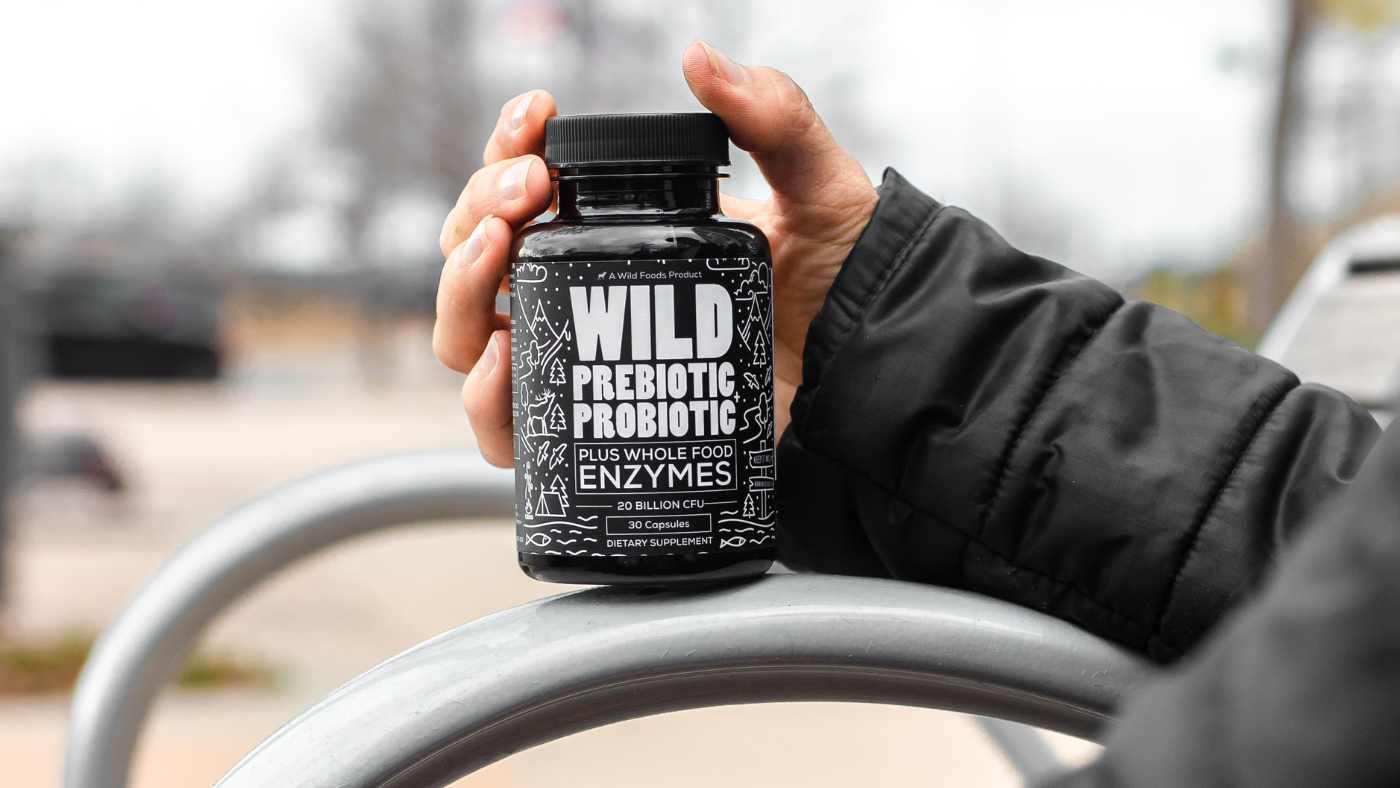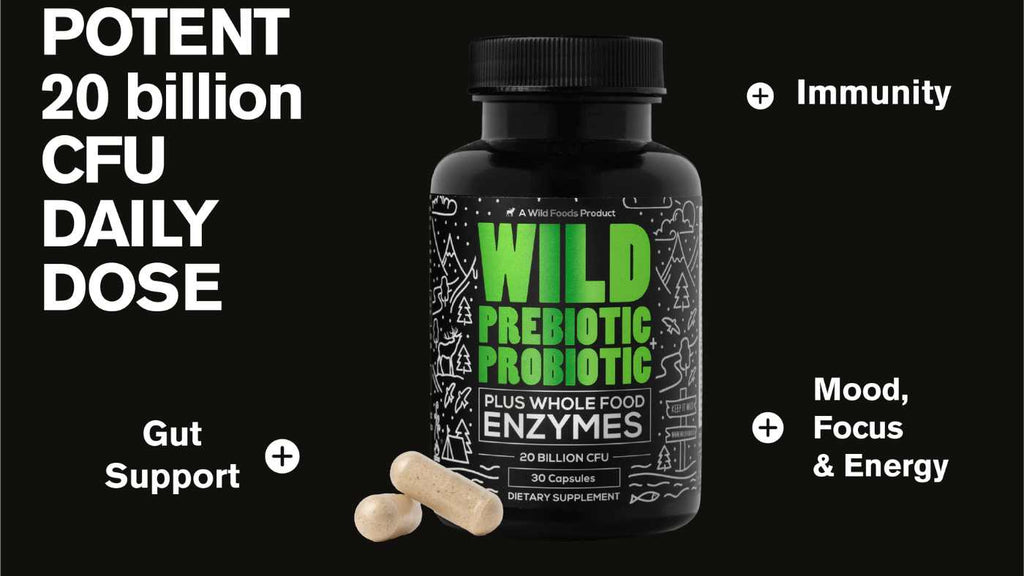Can You Take Too Many Probiotics? (Risks & Side Effects)

Do you ever wonder: "Can I have too many probiotics?"
Probiotics are beneficial bacteria, often found in supplements and fermented foods, that promote a healthy gut.
In this article, we'll delve into probiotic overdose - exploring its symptoms, risks, and how to avoid it.
So get ready to discover how much is too much regarding these helpful microorganisms!
Key Takeaways
- Taking too many probiotics can cause belly problems like gas, bloating, or diarrhea.
- Some people might get headaches from certain types of probiotic-rich foods.
- Too many probiotics might raise histamine levels in your body, causing discomfort or even trouble breathing.
- Always check the label before buying a supplement - some may contain ingredients that upset your stomach.
Can You Overdose on Probiotics?
While it's generally safe to consume probiotics, taking an extremely high dose can lead to unpleasant digestive symptoms like diarrhea, gas, and bloating.
Some people may also experience headaches from amines in certain probiotic foods or increased histamine levels due to specific strains of bacteria. (1)
Additionally, ingredients in some probiotic supplements could cause adverse reactions.
Diarrhea, Gas, Bloating, and other Digestive Symptoms
High doses of probiotics can often lead to digestive symptoms.
This could be why you've experienced gas, bloating, or diarrhea after taking a probiotic supplement.
These side effects usually come on quickly and disappear as your body adjusts to the new balance of gut bacteria.
However, if these issues persist or become severe, it's an indication that you're taking too much.
It's crucial not to ignore these signs - excessive amounts of probiotics disrupt the natural equilibrium in your gut microbiota, causing discomfort and potentially more severe problems.
Keep track of how your body reacts to different dosages so you can find just the right amount for optimal health benefits without any unpleasant side effects.
Headaches from Amines in Probiotic Foods
Certain probiotic foods contain bacterial strains that produce biogenic amines. (2)
These compounds have been linked to headaches in some individuals. The cause of the discomfort is often related to excessive intake of such types of food.
A balanced approach ensures you get all the benefits of these beneficial bacteria without any adverse side effects.
A heightened histamine level can also trigger headache symptoms, particularly among people with histamine intolerance.
This condition may occur due to overindulgence in probiotic-rich foods known for their high histamine content.
So, while occasional consumption may not pose significant risks, monitoring your intake is advisable for maintaining optimal wellness and digestive comfort.
Certain Strains May Increase Histamine Levels
Many people consume probiotics for potential health benefits, but certain strains can unexpectedly increase histamine levels in your body. (3)
Histamine is primarily associated with immune responses and mediating allergic reactions.
However, high amounts of histamine might lead to discomfort like nausea or even cause shortness of breath.
Fermented foods particularly harbor lactic acid bacterial strains - a type of probiotic that produces biogenic amines such as histamine.
Certain Ingredients Can Cause Adverse Reactions
Probiotics are generally considered safe but can cause adverse reactions due to certain ingredients.
Some probiotic supplements contain added sugars or artificial sweeteners that can upset your stomach.
Unbeknownst to you, these products might also have allergenic components like dairy, gluten, or soy derivatives.
Even naturally fermented foods with high FODMAP content, such as coconut yogurt and sauerkraut, could trigger digestive issues for some people.
Always scan the product label before purchasing a probiotic supplement and opt for ones without unnecessary additives to minimize side effects.
Those experimenting with probiotic-rich foods related to stomach distress should be taken seriously; consider seeking guidance from a nutritionist or healthcare professional when planning your diet around gut health.

Risks of Excessive Probiotics
Taking too many probiotics can increase the risk of infection, especially for those with weakened immune systems.
Our next section will learn more about this and other potential hazards of poor-quality or excessive probiotic consumption.
Probiotics May Increase the Risk of Infection for Some People
Specific individuals may be at a higher risk of infection from probiotics. If you are battling severe illness or have weakened immunity, exercising caution with these supplements is crucial.
The probiotic bacteria could escape the gut and enter your bloodstream, triggering an infection. (4)
People consuming high amounts of probiotics might also experience this increased risk. It becomes even more vital for those with underlying health conditions to consider their intake carefully.
Despite their many benefits, probiotics can pose hazards when consumed irresponsibly or inappropriately by specific demographics- especially those with compromised immune systems.
Poor-quality probiotics May Cause Reactions
Poor-quality probiotics can often lead to unwanted reactions.
These are usually products that have yet to undergo rigorous testing or adhere to strict production standards, affecting the quality and effectiveness of the product.
The result is a probiotic supplement that may contain harmful bacteria, allergens, or toxins that trigger adverse reactions in your body.
Symptoms may range from mild discomfort like bloating and gas to more severe effects like nausea and diarrhea.
To avoid these issues, choose high-quality supplements from trusted manufacturers who guarantee their products' safety and efficacy through thorough testing.

How Much Probiotics Should You Take Per Day?
Determining the correct amount of probiotics daily depends on several factors. Your overall health, dietary habits, and individual needs all play a role in determining the proper dosage.
The scientific research suggests a daily range from 1 billion to 100 billion live organisms or colony-forming units (CFUs). (5)
Different strains of bacteria offer various health benefits, so it's essential to understand what you're looking for before deciding how much to take.
For instance, Bifidobacterium and Lactobacillus are two common types often recommended for digestive discomfort and symptoms of irritable bowel syndrome (IBS).
There need to be established guidelines regarding probiotic consumption because everyone is different.
If you need more clarification about how much probiotics you should consume daily, consulting with healthcare professionals like dietitians or gastroenterologists can provide personalized advice based on your unique circumstances.
Although taking too many probiotics is unlikely to harm healthy individuals, starting with lower doses and gradually increasing over time might prevent potential side effects like gas and bloating.
Also, an overdose of poor-quality probiotic supplements may lead to unwanted reactions.
Remember this: While there's no one-size-fits-all answer when it comes down to 'how much is too much,' taking care of your gut microbiota by paying attention to its needs will nourish not only these beneficial bacteria but also your overall wellness!
It's crucial to always listen closely to your body; if something doesn't feel right after consuming probiotics or any other dietary supplements, stop use immediately and consult with a medical professional before proceeding further into unknown territory where potentially severe illnesses could lie wait!
Side Effects of Taking Too Many Probiotics
Taking excessive amounts of probiotics can lead to specific side effects. One typical response is digestive discomfort, often as gas, bloating, or diarrhea.
This happens because the sudden increase in gut bacteria can disturb your normal digestion and metabolism functions.
Although these symptoms usually subside after a while, they might be pretty unpleasant.
Long-term consumption of large doses of probiotics poses another concern.
Though not harmful per se, individuals with serious illnesses or compromised immune systems may experience increased risks of infection from bacterial strains present in some probiotic supplements.
They should, therefore, exercise caution and consult their healthcare provider before starting any new health regimen involving probiotics.

How to Avoid Probiotic Overdose
Avoiding a probiotic overdose is pretty straightforward. Here's what you need to do:
- Stick to the recommended dosage: Avoid going overboard with your probiotic consumption. Always follow the instructions on the supplement bottle or those given by a healthcare professional.
- Start slowly: Introduce probiotics into your system gradually. This means using smaller doses first and gradually increasing them as your body gets used to these beneficial bacteria.
- High-quality matters: Always choose high-quality probiotics, as poor-quality ones may trigger adverse reactions.
- Listen to your body: It might be too much for your system if you notice digestive discomfort like bloating or gas after probiotics. Consider reducing the dose.
- Rotate strains: Vary the bacterial strains in your supplements often for better gastrointestinal health and reduced risks of an overdose.
- Be cautious if you have severe illnesses or a weakened immune system: Individuals in this category should avoid probiotic supplements due to potential adverse effects.
Conclusion: Too Many Probiotics Is Unlikely To Harm You
While overdoing probiotics might lead to temporary discomfort, it's typically not a grave concern. These side effects fade as your system acclimates to the heightened bacterial activity.
Adjust your dosage based on your body's feedback to ensure you're on the right track. And when in doubt, always consult a healthcare expert.
Choose Wild's Probiotic Supplements for a quality, wild-sourced approach to gut health.
With Wild Foods Co, you're getting probiotics and investing in nature's best.
FAQs
Can you overdose on probiotics?
While it's unlikely to suffer a harmful overdose from probiotics, excessive amounts can lead to side effects like bloating, gas, and nausea. It's essential to note that individuals with weakened immune systems should seek medical advice before consuming probiotics.
What are the common side effects of taking too many probiotics?
Common side effects include bloating, gas, nausea, and an upset stomach. In some cases, diarrhea might also occur. These symptoms are typically mild and may subside as the body adjusts.
Is there a recommended dosage for probiotics?
The average dose for probiotic supplements is between 1 to 10 billion colony-forming units (CFUs). However, the effective dosage can vary based on individual needs and the specific probiotic strain. It's always best to consult with a healthcare professional for personalized advice.
Can taking too many probiotics harm your gut health?
While probiotics aim to foster the growth of beneficial bacteria in the gut, excessive intake might counteract these positive effects. Overconsumption can lead to an imbalance in the gut microbiota, potentially causing discomfort.
How can I ensure I'm taking the right amount of probiotics?
Due to the unregulated nature of the probiotic supplement market, it's challenging to determine the exact CFUs in a product. It's recommended to consult with a doctor or healthcare provider to determine the appropriate dosage for your needs.
Are there natural sources of probiotics?
Yes, fermented foods like yogurt are natural sources of probiotics. However, factors like storage conditions and the specific probiotic strain can influence the effectiveness of these foods.
Related Studies
- A study published by the National Center for Biotechnology Information (NCBI) suggests that probiotics may introduce beneficial functions into the gastrointestinal tract or enhance the functionality of existing microbial communities.
- A study published by the National Center for Biotechnology Information (NCBI) provides a review of biogenic amine production by lactic acid bacteria.
- A study published by the National Center for Biotechnology Information (NCBI) suggests that certain strains which are considered potentially probiotic, for example Lactobacillus saerimneri 30a, produce a significant amount of histamine.
- A study published by the National Center for Biotechnology Information (NCBI) suggests that probiotics have been used safely in foods and dairy products for over a hundred years.
- A study published by the National Center for Biotechnology Information (NCBI) suggests that the effectiveness of probiotics is strain-specific, and that different strains may have different health benefits.
